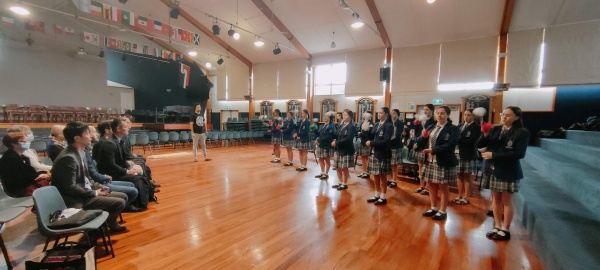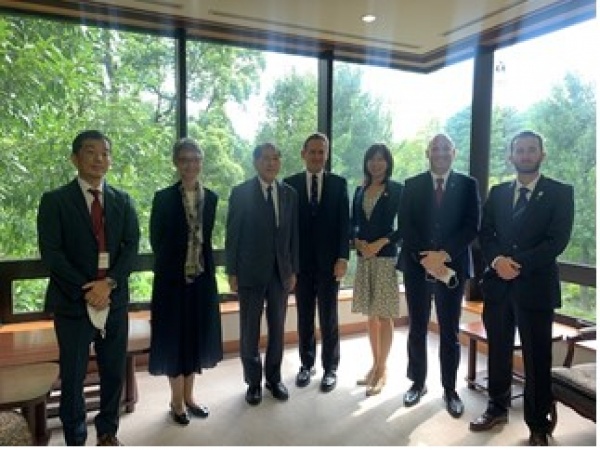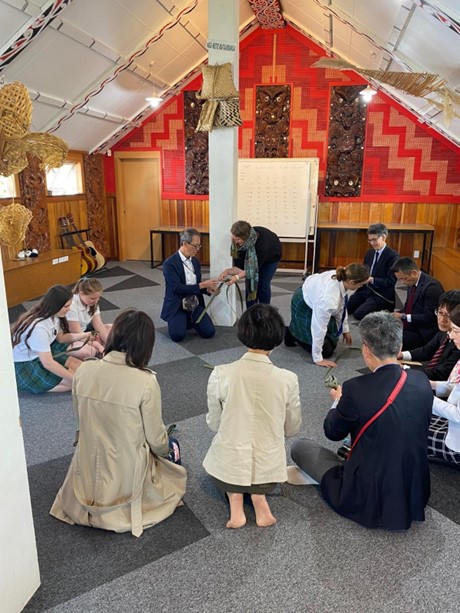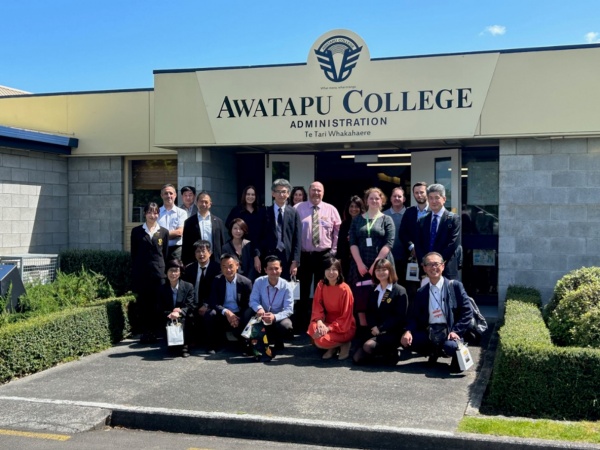Search
Showing 10 of 6396 results
-
ENZ calls for funding proposals for New Zealand-China research partnerships
The New Zealand-China Tripartite Partnership Fund 2023 offers funding of up to NZD 20,000-30,000 for each partnership project, with the call for proposals open until 1 March 2023.
Funding proposals are due by 1 March 2023. Download the New Zealand-China Tripartite Partnership Fund 2023 Guidance and Call for Proposals and the Proposal Form. Send your completed proposal as a PDF, and any questions, to china@enz.govt.nz.
The fund supports new or existing research partnerships between New Zealand and Chinese universities. There are usually three universities involved – two from China and one from New Zealand.
The Tripartite Partnership Fund, administered by ENZ, has a pool of up to NZD 100,000 in 2023 for research partnerships in the arts, humanities, social sciences, sciences and applied sciences. Designed to encourage strategic academic relationships, it supports the creation or development of the partnership rather than funding the research itself.
With the global Covid-19 pandemic restricting some international travel, the fund welcomes innovative ideas. Current investments include digital technology services, communications platforms, translation costs and journal access.
At the recent New Zealand-China 10th Joint Working Group held on 22 November, senior officials at the meeting noted the value of Tripartite research relationships and the impact of having funding from both governments to establish new partnerships or nurture established research collaboration. Li Qing, Deputy Secretary General China Scholarship Council, remarked on the benefits of both student mobility through scholarships and closer research links such as the Tripartite Partnership Programme. The co-chair of the Joint Working Group, Vice Minister Tian Xuejun, stated in his closing remarks that China and New Zealand should continue to strengthen existing cooperation activities, listing the Tripartite Partnership Programme as one of the initiatives.
Lisa Futschek, General Manager International, reinforced ENZ’s commitment to administering the fund.
“We remain committed to the Tripartite Partnership Programme and its valuable contribution toward stronger global connections, research links and partnerships – key goals under the revised New Zealand International Education Strategy, launched by Minister Hipkins in August this year. We look forward to many more partnerships under this programme.”
Established in 2005, the Tripartite Research Partnership is a valued part of the New Zealand – China bilateral education relationship and we welcome proposals from researchers to join the growing list of funding recipients.
Funding proposals are due by 1 March 2023. Download the New Zealand-China Tripartite Partnership Fund 2023 Guidance and Call for Proposals and the Proposal Form. Send your completed proposal as a PDF, and any questions, to china@enz.govt.nz.
-
Looking back and looking ahead in India
“We’ve seen some successes and we also have some learnings to share with the sector,” says Jugnu Roy, ENZ’s Director of Engagement based in New Delhi.
“With New Zealand’s borders remaining closed for the first half of 2022, it was certainly a challenge to sustain the Indian student pipeline into New Zealand for higher studies. We knew going conventional wouldn’t help, and so we amped up our PR efforts.”
Aligned with ENZ’s approach of offering future-focused education, the team targeted learning opportunities for tertiary students under the umbrella of an integrated campaign – Unlock Potential for the New You. Using digital platforms as well as mainstream media, the strategy included a mix of suitable learning opportunities and unique ways of engaging with our stakeholders. This successful campaign won Gold awards at 2022 South Asia SABRE Awards, ETBrandEquity Kaleido Awards, STAKES PR & Communications Excellence Awards 2022; Silver at Adgully IMAGEXX Awards 2022 and a Bronze at Campaign India PR Awards 2022.
Kick-starting the year with the first event of its kind, ENZ’s India team hosted the ‘Women of the Future’ virtual event. To ensure maximum reach, we collaborated with leading digital platforms such as Femina India and Tweak India, among others, achieving more than 5.8 million impressions. More recently, the collaboration with popular Indian celebrity Soha Ali Khan is helping to create a stronger recall value of New Zealand among Indian study abroad aspirants.
2022 was also a year of big announcements from New Zealand such as the global I AM New Campaign, the reopening of New Zealand’s borders, new scholarships exclusively for Indian students, and a series of visits from New Zealand universities to name a few. Supported by our PR agency, Ruder Finn India, these announcements all made headlines in prominent Indian publications and portals including The Hindu, The Indian Express, Financial Express, and Education Times.
“It’s always a challenge to be heard,” Ms Roy says.
“Some types of stories are much more likely to be picked up than others. For example, stories about our borders reopening, new research on Covid-19, scholarships for Indian students, the United Nations Sustainable Development Goals (SDGs) are of interest, as well as stories about Indian students or academics.
“Our team is always interested in success stories involving Indian students, and we look to New Zealand education providers to help us with sourcing these.
“It’s also important for institutions to be selective about the timing of their announcements, so journalists have the space to focus on each story, rather than choosing between multiple announcements at the same time.
“It's good to establish a single spokesperson for a given institution, and to ensure that Indian journalists seeking information get a timely response – if it’s a wide-ranging article they are likely to go ahead without input from New Zealand, which is a missed opportunity.”
The team is busy pulling together their plans for 2023, including how best to profile these initiatives to ensure high visibility.
“Finally, I would really encourage New Zealand tertiary education providers to think carefully about what Indian students and their families are seeking from investing in an international education experience, and how individually and as a sector we can work together to meet those expectations,” Ms Roy says.
-
Japanese teachers experience New Zealand’s regional schools
“Waseda University and its affiliated schools are longstanding and valued partners for us,” says Misa Kitaoka, Director of Education in Japan for Education New Zealand Manapou ki te Ao (ENZ).
“It’s exciting to see the strong regional focus they have chosen for their students’ study in New Zealand in 2023 and hear about the planned growth of the programme.”
Waseda University schools will be sending up to 60 students on a group programme to schools in Manawatū and Hawke’s Bay for two weeks in March 2023. The two regions were selected to receive students after taking part in an Expression of Interest process. Close to 80 students have already applied to take part, and Waseda plans to increase the number of participants to 100 from 2024, and to increase the length of their visit in future years.
ENZ hosted the familiarisation tour (famil) to Manawatū and Hawke’s Bay from 21- 25 November 2022. Four Tokyo schools took part alongside Waseda University: Waseda University Senior High School, Waseda University Honjo Senior High School, Waseda Jitsugyo High School and Waseda Saga Junior and Senior High School. The famil was co-funded by ENZ and Air New Zealand, and Palmerston North City Council and Learning Hawkes Bay played a major role in helping to organise visits to 14 different education providers.
“Through the five-day famil, our regional and institutional partners demonstrated their strengths and uniqueness,” says ENZ’s Director Marketing and Strategies, Patrick Holden, who travelled with the delegation.
“Delegates commented on how welcome they felt and how impressed they were to see indigenous Māori language and customs being incorporated into the school curriculum. The manaakitanga shown by the different institutions was well received, especially the pōwhiri.”

The delegation is welcomed with a powhiri at Napier Girls High School
Misa Kitaoka stressed the importance of destination marketing with support from regional partners.
“While decision-making tends to be institution-led in the tertiary sector, decisions for the school sector are often led by the region or city. This famil was a great opportunity for us to showcase the regions first, followed by the education offerings available in the regions.
“Japanese school students, parents and educators are also interested in cultural experiences in New Zealand beyond education, including the opportunities to interact with local students and host families, and to embrace New Zealand’s cultural values of diversity and inclusion.
“While video-calling offers many benefits and has been vital across the pandemic, bringing famils back into the country means our offshore stakeholders can experience first-hand what New Zealand has to offer. Regional involvement will play a key role in building long-term reciprocal relationships for Aotearoa.”
For more on ENZ’s education partnership with Waseda University and its affiliated schools, please click here.
For more on the value of short-term programmes for international students in New Zealand and the potential benefits to New Zealand and the educator sector, check out this recent Spinoff article: How educational exchange fosters more than just learning | The Spinoff

Hamish Cooper, NZ Ambassador to Japan, and ENZ staff Misa Kitaoka, Patrick Holden and Ben Burrowes called on the President of Waseda University, Dr Aiji Tanaka and Prof. Kate Elwood, Dean of Centre for International Education recently to congratulate Dr Tanaka on his reelection as the 18th President of Waseda University

The delegation was welcomed on to the Central Hawkes Bay College Marae where they were given background about the history of the marae and given a quick fire class in flax weaving

Waseda delegation outside Awatapu College
-
International recognition for New Zealand educational robot KaiBot before official launch
The AI-enabled robot, KaiBot, which has won the award two months before its official launch date, is designed to support 5 to 15-year-old children to develop coding skills.
The Smart Toys competition is coordinated by the Dubai Future Foundation in collaboration with the World Economic Forum to highlight the best-emerging AI toys in education. The competition attracts innovators, entrepreneurs, toy developers, and start-ups from 20 countries globally.
Education New Zealand Manapou ki te Ao (ENZ) has been offering wraparound support to Kai’s Education over the last year, including supporting them to participate at EduTech Australia in August, profiling them with a spotlight feature with EdTechNZ, and offering support and insights as they venture into the UAE region.
ENZ’s Business Development Manager Alana Pellow, who has been working with Kai’s Education, said this was a fantastic outcome for New Zealand’s edtech community.
“KaiBot is a great example of how innovative and fun technology can positively impact education outcomes for young learners. It’s wonderful to see the Kai’s Education team achieve international recognition for the transformative impact their edtech has on learners.”
Read more about EdTech company Kai’s Education and KaiBot on this link.
-
Latest insights on international education
“As we approach the end of 2022, we have an opportunity to take stock, and importantly look forward to next year, one in which we all hope to welcome increasing numbers of international students back to New Zealand,” says Marie Clark, Director Insights at Education New Zealand Manapou ki te Ao (ENZ).
“Despite the long period of border closure there has been only slightly altered demand for international study. Our annual brand tracker shows the New Zealand brand is holding a strong position globally.”
ENZ has been closely tracking the beginnings of recovery. As New Zealand's border reopens, the immediate priority is for international education providers to build back their onshore offerings and attract students back to Aotearoa. The content of this issue is focussed on toward data and analysis related to our initial observations of the sector's recovery.
The Insight Story - Issue 6 includes insights on:
- Student visa applications and Study with New Zealand web stats
- New Zealand's education brand health
- Agent perceptions about international education
- 2021 international student enrolments
- New Zealanders' perceptions of the value of international students
- and more……
Visit IntelliLab to download The Insight Story here.
-
New Zealand-German university projects funded
The arrangement for the exchange of early-career academics (PPP) was signed between ENZ and the German Academic Exchange Service (DAAD) in November 2021, and applications for this round of funding closed in June. It enables young academics involved in the projects to further their careers and expand international research links.
The four successful New Zealand applications came from academics at Massey University, University of Auckland, University of Canterbury, and University of Waikato. The projects, undertaken with German university partners, cover a range of subject areas, from biotechnology and microbiology, to law and sustainable landscape development, to engineering and climatology.
This is the first time ENZ has offered funding under the PPP programme. We plan to launch a second round in April 2023 for projects that will take place from 2024 and 2025.
-
Reminder about education providers’ responsibilities when using education agents
The responsibilities for Code signatories are covered in detail in Section 38 (for tertiary education providers) and Section 58 (for school education providers). Section 38 reads as follows:
38. Process 2: Managing and monitoring education agents
Signatories must have practices for effectively managing and monitoring the performance and conduct of education agents in relation to learner safety and wellbeing under this code, including –
(a) carrying out and recording reference checks on potential education agents to ensure as far as possible that they are not involved in any conduct that is false, misleading, deceptive, or in breach of the law; and
(b) entering into written contracts with each of its education agents; and
(c) during the term of a contract, monitoring the activities and performance of its education agents in relation to –
(i) their obligations as specified in the contract; and
(ii) whether they provide prospective and enrolled international tertiary learners with reliable information and advice about studying, working, and living in New Zealand; and
(iii) whether they act with integrity and professionalism in their dealings with prospective and enrolled international tertiary learners; and
(iv) whether they have engaged in any activity or conduct that, in the opinion of the signatory, is or may be in breach of the law or that jeopardises the signatory’s compliance with this code; and
(d) managing the education agents by –
(i) terminating contracts with an agent if there is evidence which, on balance of probabilities, shows that the education agent –
a. has been involved in any serious, deliberate, or ongoing conduct that is false, misleading, deceptive, or in breach of the law; or
b. has jeopardised the signatory’s compliance with this code; or
(ii) taking appropriate action to address misconduct by act or an omission by an education agent in relation to the other matters described in subclause (c); and
(e) ensuring that its education agents have access to, and maintain, up-to-date information relevant to their duties as specified in the contracts with the signatory.
The full Code is available on the NZQA website here.
-
Student Ambassadors build global citizenship skills
Since it was set up in 2021, the programme has involved around 85 secondary and 50 tertiary students in six participating regions – Northland, Auckland, Tauranga and Western Bay of Plenty, Hawkes Bay, Whanganui and Wellington. Northland acted as national coordinator.
“International students can sometimes find it difficult to connect with locals, make friends or venture outside their campus,” says Sahinde Pala, GM Sector Services at Education New Zealand Manapou ki te Ao (ENZ).
“Language and cultural barriers, hesitation to meet new people, lack of knowledge of opportunities off campus, or budget constraints – many factors can play a part. The emergence of Covid-19 and lockdowns made it even more important to address these challenges, and so we worked with a range of people, including regional partners and Welcoming Communities, to develop the student ambassador programme.”
The programme has developed differently in each region, but with the same shared goals. Another common factor has been the training provided for student ambassadors – the opportunity to complete a New Zealand Global Competence certificate, training in social media, and specially tailored training provided by ISANA NZ.
“Student ambassadors are bridgebuilders and leaders, who create opportunities for students from different cultures to form relationships and learn about each other,” Ms Pala says.
“The ambassadors themselves also gain from the programme, by developing their understanding of cultural differences and learning new skills and strategies that are valued by employers. And regional communities benefit when international students feel valued and connected – they are more likely to remain in the area or recommend it to others.”
The ISANA NZ Student Ambassador Training explores intercultural concepts in an interactive and engaging format that can be run online or in-person. Participants are then able to apply their learning to develop activities and events that help students to connect with the wider community. Debrief sessions towards the close of a programme cycle support students to reflect on what they have learned from being a student ambassador.
“I enjoyed learning about how communication works between different cultures, going over cultural values and how some are visible and invisible and learning top tips to help me improve as an ambassador” – student feedback.
“Our Northland student ambassadors joined the ISANA workshop as a group of excited students interested in global citizenship and finished as a tight knit group of inter-cultural leaders in the school community. They learnt to work together, giving everyone a chance to contribute and respecting each other’s perspectives. The communication and planning skills honed in the workshop, enabled them to run a large-scale ‘Matariki Kai Festival’ event, introducing a range of food from cultures across the school to the students.” – Jo Lees, National Ambassador Coordinator and Project Manager at Study Northland.
Other activities sparked by the programme in different parts of New Zealand have included a Kiwi Cooking Class, an Auckland Weekly video series, international languages week events and Matariki events organised and run by the ambassadors, diplomatic events attended by ambassadors from other countries and an International Students Issues Panel Discussion.
One of the student ambassadors was recently profiled by ENZ: Michael Ren – Award-winning app designer eyes a future in tech | Education New Zealand (enz.govt.nz)
Several regions have indicated they hope to continue their student ambassador programme beyond 2022: Northland, Tauranga and Hawke’s Bay.
“This student ambassador training is much needed, not only for the international education sector but also across wider communities in New Zealand. In fact, I think everyone could benefit from this training if they have not received similar training before in intercultural communications and leadership,” says Wenhua Yang, Regional Manager at Learning Hawkes Bay.
To learn more about the ISANA NZ Student Ambassador Training, please contact: caroline.stevenson@isana.nz
-
Innovative leadership programme funded by PIF proves great success
The Crusaders partnered with Christchurch-based education provider Boma to develop an engaging online leadership programme sharing the Crusaders Way with rugby coaches for all age levels. The programme draws on rugby legends Scott Robertson, Robbie Deans, Kieran Read and Samuel Whitelock to help participants build a connected and skilful team.
The Crusaders chose to collaborate with Boma because of the values alignment between the two organisations, combined with Boma’s expertise in crafting compelling, impactful, scalable online learning experiences.
Boma is a recipient of ENZ’s Product Innovation Fund, which assists in the development of programmes that deliver new, meaningful and unique learning experiences from New Zealand, for the world.
The funding allowed Boma to embark into a new area and develop the Crusaders pilot programme. Boma already runs events, workshops, and courses, and has worked with leading organisations in Aotearoa and around the world. Some of Boma’s clients include IAG, Meridian Energy, Stuff and New Zealand Trade and Enterprise.
While fully on-demand online courses have been around for a long time, they typically generate low completion rates. Boma’s approach is different, creating a cohort of learners who move through the programme together, leveraging pre-recorded video with time-sensitive community engagement.
Boma founder Kaila Colbin says their unique method delivers extraordinary outcomes.
“Our programmes are designed to offer the quality and impact of Stanford, the scalability of Masterclass, and the excitement and shared experience of TED,” she says.
Kaila explains that the coaches have the flexibility to complete the course in their own time but have a sense of urgency and accountability because of the community element.
The two-week pilot was completed by 114 coaches from 14 countries. It had glowing written feedback and earned a Net Promoter Score, or NPS, of 80%. NPS is a widely used customer satisfaction benchmark in which the potential score ranges from -100 to +100. A positive score is considered good and a score above 50 is considered outstanding.
Boma has big plans for the future, growing from rugby leadership to sports leadership to business and general leadership.
Registrations are open for the next Crusaders course, which starts on 30 January 2023.
Find out more about Boma here and find out more about the Crusaders Coaching Leadership Programme™ here.
-
BINUS School Serpong wins the KIWI Challenge 2022
The winning team’s ‘Beyond Borders’ idea involved the development of a travel planning app that streamlines and personalises the travel planning process. The team also had a strong focus on local community engagement and inclusivity across people with different abilities.
The KIWI Challenge is an annual ENZ initiative run in partnership with one of New Zealand’s universities. This year Te Kunenga ki Pūrehuroa – Massey University was nominated and chose the topic of sustainable business and entrepreneurship in the tourism industry.
The competition sees participating students from schools across Java and Kalimantan provide an innovative solution or idea on a given theme.
ENZ runs the competition in collaboration with in-market partner, Kopi Tuli (Deaf Cafe), a hearing-impaired community in Jakarta. This partnership is aligned with ENZ’s strategic framework to nurture and encourage diversity, equity, and inclusion, while also showcasing sign language as one of New Zealand’s official languages.
Education Minister Chris Hipkins officially launched the 2022 KIWI Challenge during his visit to Jakarta in October.
The top prize includes vouchers worth $1,000 NZD with team members being able to undertake a virtual internship with Massey University.
The virtual internship will teach students practical skills to ‘take their idea to the world.’ Through eight hours of customised supervision from some of Massey’s academic marketing experts, students will learn how to add value to their idea and create a digital marketing plan to effectively launch their business solution.
The judging panel included ENZ’s General Manager – Marketing and Communications, Geoff Bilbrough; Massey University’s Director of Strategic Partnerships, Dr. Jeffrey Stangl; and co-founder of Kopi Tuli, Tri Erwinsyah Putra.
“I was hugely impressed with what I saw today, you [the students] can be very proud of yourselves and feel very optimistic about the future that you have before you,” Mr Bilbrough said.
Dr Stangl added, “If the future of the planet is in your [the students] hands, then we’re in good shape. Each one of the teams have thought through some very innovative ideas and solutions to problems unique to Indonesia.”
This year, the competition had 36 teams from 18 schools across the Java and Kalimantan regions participating with their innovative ideas and business pitching skills to develop their idea and create a 2–3-minute video presentation to submit to the competition.
Five teams were shortlisted to attend the finals, which were held live in-person (Jakarta) and online (Zoom). Finalists then presented their business solution for sustainable tourism, followed by a question-and-answer session with the judging panel.

The winning BINUS School Serpong team present their ‘Beyond borders’ strategy. Pictured above (from left to right): Isabel Jo Orleans, Darlene Christabelle Wijaya, Rafael Rangga Natariano, and Calista Zahra Caesariyani


